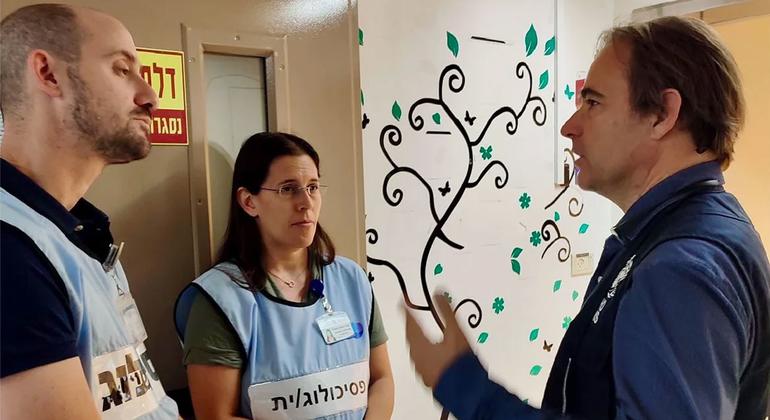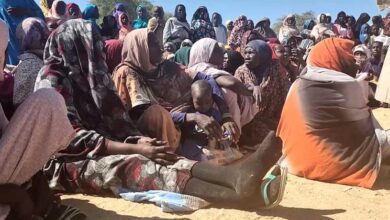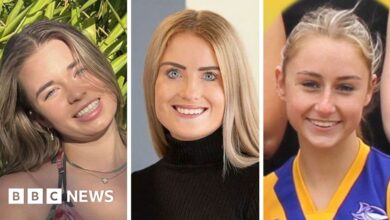WHO highlights the mental health crisis facing Israel’s frontline workers one year after the October 7 attacks


Responders including ambulance drivers, paramedics and forensic teams identified many of the dead, all of whom witnessed “carnage and horror” that resulted in lasting injuries .
An organization called Mashiv Ha’Ruach, which means “Bringing the Spirit Back,” provides mental health and psychosocial support through workshops supported by WHO/Europe. These sessions allow workers to discuss their trauma and develop coping mechanisms.
The organization’s founder, Eyal Kravitz, said he founded the group days after the attacks because he wondered, who will help the helpers?
Workshops
Many recovery volunteers who offered support after the attack developed insomnia, post-traumatic stress disorder (PTSD), depression and high levels of anxiety, causing a “ripple effect affecting their families and workplaces”.
Mashiv Ha’Ruach’s workshops are part of the retreat and take place in the desert, away from the “noise and distractions of everyday life” and encourage participants to share what they have learned. undergo.
“At first, no one thought they needed to talk about their experiences,” said Daniel Chermon, co-founder of Mashiv Ha’Ruach.
“So it was hard for us to convince them to come at first, but once they came, people started hearing from their colleagues about the value of the retreats.”
Oz Tal, who was the first to respond on October 7, said the workshop gave him “a language to describe and express his feelings.”
“First of all, most of the volunteers, when I told them to come to the retreat, they told me they were fine. They don’t need anything. They don’t want to come,” Mr. Tal said.
He continued: “But during the retreat, after we started talking about our feelings, the first person started talking and sharing their problems, then the whole group started. You can’t imagine the spirit in the room at that time.”
Work with volunteers
Atzmon Meshulam developed the workshop program and said the workshops help participants change the way they talk about what they have experienced. She noted that many volunteers seemed calmer after the sessions.
“I received a text message from the wife of a volunteer attending the workshop. She wrote me that she had a new man back, that this was his first sleepover since October 7,” Ms. Meshulam recalled.
“I received no support before attending the meetings,” said Hodaya Leshem, one of the workshop attendees, a mother of four and married to a soldier.
“I had to bring everyone in my family and community together, but there was no one there to hold me back,” she continued.
Mashiv Ha’Ruach has now expanded its workshops to partners of affected staff and volunteers “to build a wider network of resilience skills and support”.
Testimony
Soroka Medical Center, a hospital nearly 25 miles from Gaza, served 680 patients – including 120 seriously injured – within 16 hours of the October 7 attack.
WHO said many staff members had lost loved ones or lived in areas hit by attacks.
Dr. Dan Schwarzfuchs, Director of the Emergency Department at Soroka Medical Center, said the workers would not have survived without good health.
“I knew in my gut I had to find something that would help them be resilient,” he said.
He said the therapy provided through the workshops has helped foster relationships among the health center’s staff.
“Colleagues who previously did not want to talk about their experiences are now more open because they hear about other people’s experiences,” says Dr. Schwarzfuchs. “People I didn’t expect to attend are now doing so.”
The retreat also benefited Ayelet Harris, Head of the Kibbutz Movement’s Community Department, who said the sessions provided a space for responders to express themselves for the first time.
“During the retreat, I felt like it was one of the first times I felt energized because the focus was on me and my needs,” Ms. Harris said. “It was a safe place for me to express what I was going through and have someone there listen to me…It was refreshing and renewing.”
Provide support
Since the beginning of 2024, Mashiv Ha’Ruach has helped nearly 1,000 people through their workshop retreats.
“We started Mashiv Ha’Ruach under unfavorable circumstances. But the reality is that people need it and they will still need it for years to come,” co-founder Chermon said.
Founder Kravitz said their partnership with the health organization has allowed access to many individuals.
“We are proud to be the only recovery initiative in Israel recognized by WHO thanks to the recommendation of the Israeli Ministry of Health,” he said. “This collaboration has been invaluable and I want to express our deep appreciation to WHO.”
In addition to supporting Mashiv Ha’Ruach, WHO also supports the Israeli NGO Mosesa through an initiative related to
religious leaders from both Jewish and Muslim communities, to connect individuals with helpful mental health resources, increase uptake, and reduce stigma when seeking treatment treat.




